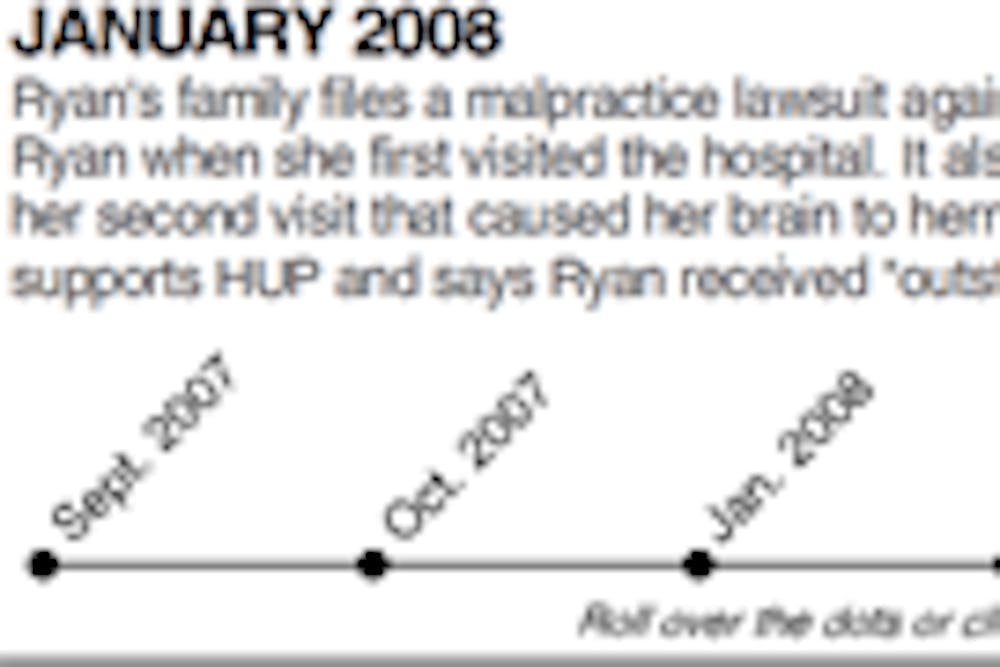
Then-College sophomore Anne Ryan passed away from meningitis in fall 2007. In January 2008, her family filed a medical malpractice suit against the Hospital of the University of Pennsylvania.
The Hospital of the University of Pennsylvania and the family of Anne Ryan, a then-College sophomore who died of bacterial meningitis on Sept. 9, 2007, agreed yesterday to settle a lawsuit brought by the family alleging malpractice during Ryan’s treatment at HUP.
Thomas Kline, the Ryan family’s attorney, issued a statement on behalf of his clients and HUP saying that an agreement had been reached without a need for further litigation.
“Beyond stating that the parties agree that this settlement is in the best interests of all concerned and that they are grateful for the assistance of the Court in reaching this agreement, there will be no further comment,” the statement said.
The decision came just before opening arguments were set to begin. The start of the trial had already been postponed by nearly two days due to the need to replace one of the jurors, Kline said.
HUP lawyer James Young declined to comment further.
Ryan’s older brother Jed filed a lawsuit against the HUP in January 2008 alleging that the hospital’s departments and doctors acted negligently in performing a lumbar puncture on Ryan that caused her brain to herniate.
The procedure, which is meant to test spinal fluid for the presence of the meningococcal bacteria that cause meningitis, was the second lumbar puncture Ryan received at HUP within a three-day period.
The suit alleged that this additional treatment was unnecessarily risky.
Penn Law professor Tom Baker, who is unaffiliated with the case, said the settlement of medical malpractice cases before going to trial often depends on how liable the doctor appears to be.
“Cases in which there is doubt about whether the doctor was at fault or not will have to go to trial,” he said.
Baker explained that plaintiff’s lawyers who do not believe they can find the doctor guilty will want to settle prior to trial because they must pay for the litigation themselves.
Similarly, cases in which evidence points to the doctor’s guilt may be settled in order to preserve the doctor’s reputation, Baker said.
Leon Aussprung, a Philadelphia-based medical malpractice attorney unaffiliated with the Ryan case, said Pennsylvania insurance policies likely caused the case to be settled around the time the trial was scheduled to begin.
The first $500,000 of the $1 million in liability insurance all Pennsylvania physicians must carry is covered by the state’s Medical Care Availability and Reduction of Error fund and the state tends not to get involved in malpractice lawsuits early, Aussprung said.
The MCARE fund requires all settlements to be confidential, he added.
While the settlement amount is undisclosed, Aussprung said a settlement like this one is generally a “compromise” between what the plaintiffs and the defendants would want.
“Frequently, both parties come away unhappy,” he said.
Despite the fact that plaintiffs typically do not receive the full amount of restitutions they originally asked for, Aussprung said plaintiffs can find solace in the fact that settlements, unlike trial verdicts, cannot be appealed.
A settlement “gives parties a final resolution of the dispute without admitting liability,” he said.
Staff writer Daniel Albornoz and Managing Editor Rebecca Kaplan contributed to this article.
The Daily Pennsylvanian is an independent, student-run newspaper. Please consider making a donation to support the coverage that shapes the University. Your generosity ensures a future of strong journalism at Penn.
DonatePlease note All comments are eligible for publication in The Daily Pennsylvanian.







